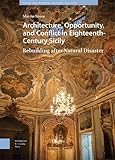Architecture, Opportunity, and Conflict in Eighteenth-Century Sicily : Rebuilding after Natural Disaster / Martin Nixon.
Material type: TextSeries: Visual and Material Culture, 1300 –1700 ; 46Publisher: Amsterdam : Amsterdam University Press, [2023]Copyright date: ©2023Description: 1 online resource (284 p.)Content type:
TextSeries: Visual and Material Culture, 1300 –1700 ; 46Publisher: Amsterdam : Amsterdam University Press, [2023]Copyright date: ©2023Description: 1 online resource (284 p.)Content type: - 9789048551767
- 720.94509033 23//eng/20230501eng
- online - DeGruyter
| Item type | Current library | Call number | URL | Status | Notes | Barcode | |
|---|---|---|---|---|---|---|---|
 eBook
eBook
|
Biblioteca "Angelicum" Pont. Univ. S.Tommaso d'Aquino Nuvola online | online - DeGruyter (Browse shelf(Opens below)) | Online access | Not for loan (Accesso limitato) | Accesso per gli utenti autorizzati / Access for authorized users | (dgr)9789048551767 |
Frontmatter -- Table of Contents -- List of illustrations -- Acknowledgments -- Introduction -- 1. Sicily as a Colonial Possession c. 1600– 1750: Subordination and Resistance -- 2. The Hexagonal Towns of Avola and Grammichele: Urbanism, Fortification, and Coercion -- 3. The Palaces of Noto: Ornament, Order, and Opportunism -- 4. The Palazzo Biscari in Catania: Lightness, Refinement, and Distinction -- 5. The Palazzo Beneventano in Scicli: Trauma and Violence -- 6. The Palaces of Ragusa: Abundance, Famine, and the Grotesque -- Conclusion -- Glossary -- Bibliography -- Index
restricted access online access with authorization star
http://purl.org/coar/access_right/c_16ec
The catastrophic Sicilian earthquake of 1693 led to the rebuilding of over 60 towns in the island’s south-west. The rebuilding extended into the eighteenth century and gave opportunities for the reassertion and the transformation of power relations. Although eight of the towns are now protected by UNESCO, the remarkable architecture resulting from this rebuilding is little known outside Sicily. This is the first book-length study in English of this interesting area of early modern architecture. Rather than seek to address all of the towns, five case studies discuss key aspects of the rebuilding by approaching the architecture from different scales, from that of a whole town to parts of a town, or single buildings, or parts of buildings and their decoration. Each case study also investigates a different theoretical assumption in architecture, including ideas of the Baroque, rational planning, and the relegation of decoration in architectural discourse.
Mode of access: Internet via World Wide Web.
In English.
Description based on online resource; title from PDF title page (publisher's Web site, viewed 06. Mrz 2024)


